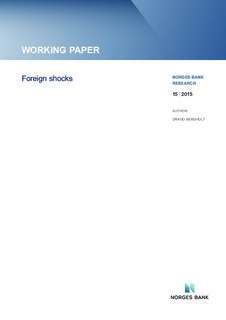Foreign Shocks
Working paper
Published version
Permanent lenke
http://hdl.handle.net/11250/2495798Utgivelsesdato
2015Metadata
Vis full innførselSamlinger
Sammendrag
How and to what extent are small open economies affected by international shocks? I develop and estimate a medium scale DSGE model that addresses both questions. The model incorporates i) international markets for firm-to-firm trade in production inputs, and ii) producer heterogeneity where technology and price setting constraints vary across industries. Using Bayesian techniques on Canadian and US data, I document several macroeconomic regularities in the small open economy, all attributed to international disturbances. First, foreign shocks are crucial for domestic fluctuations at all forecasting horizons. Second, productivity is the most important driver of business cycles. Investment efficiency shocks on the other hand have counterfactual implications for international spillover. Third, the relevance of foreign shocks accumulates over time. Fourth, business cycles display strong co-movement across countries, even though shocks are uncorrelated and the trade balance is countercyclical. Fifth, exchange rate pass-through to aggregate CPI inflation is moderate, while pass-through at the sector level is positively linked to the frequency of price changes. Few of these features have been accounted for by existing open economy DSGE literature, but all are consistent with reduced form evidence. The model presented here offers a structural interpretation of the results.

